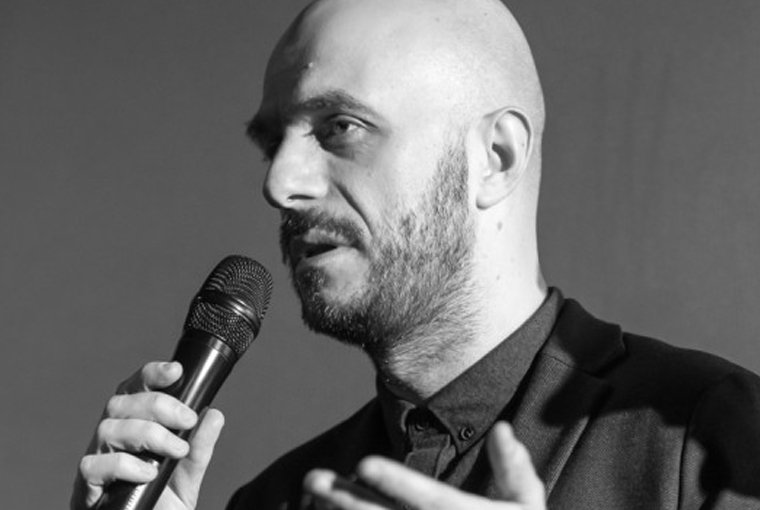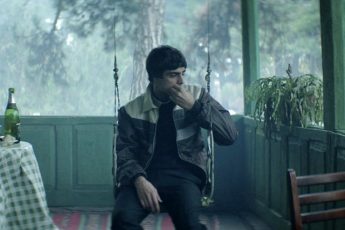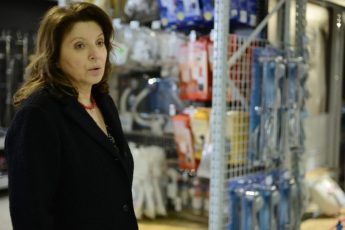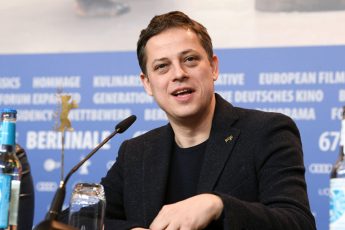
Rati Oneli’s debut feature “City of the Sun” was featured in the Berlinale’s Forum section. We spoke to Oneli about the making of his film, his conceptual approach, and plans for the future.
How did you end up in the city of Chiatura?
I was born in Georgia, I grew up in Georgia, but I never went to that city. Its location is quite central, it’s located in the middle of the country, but what’s weird is that everyone goes around it. All the major important points of destination are allocated in a way that you have to take longer roads to get to them, to the sea, to the mountains and of all that. About 5 years ago, I came across these photographs that my producer took, my co-writer and producer. She was working there on a short film, on some kind of romantic comedy, and she was very angry that they were using that location as a soulless backdrop. She couldn’t believe it. So anyways, she showed me the photos and I was blown away. At that time, I was living in New York, I lived there for 15 years, and I decided to move back to Georgia. I visited the city and right then I knew that I couldn’t go back, I had to do something. So that’s how it all materialized.
Was it clear from the beginning that it would be a documentary?
I knew that I had to do something, but I also understood that it was such an immense challenge, with such immense responsibilities to the people who live there. At that time I didn’t think that I had the moral right to do anything without completely understanding the city and what the people were going through. It would have been very easy to take a very observational standpoint and just say “this is what I see” in the way of ruin porn. So that’s why I stayed alone in the city for about 6 months and I tried to immerse myself in life there, to get to know people and breathe the same air, so to speak. And once I met the protagonists, which took a long time, I became very close to them. They let me into their lives. I became very close with their families and I basically fell in love with them and the people there. And then I understood, I thought I had the right, the moral right, to tell their story. I understood that it wouldn’t be anything objective, it wouldn’t be any kind of factual information. It was going to be completely subjective, and my own personal impression. I realized that they could guide me into their lives both physically and allegorically, and they have their own impression of the space where they lived. So it would be my own interpretations of their impressions, and then it made sense that this is how I would do it.
At that point were the style and approach already formed in your mind?
Yes, absolutely. For the most part, I think some of the structural and dramaturgical points were found later in the editing, but in terms of approach, yes, definitely. I knew how I wanted to build it from the beginning. Part of the approach was my stay there, that’s what enabled me to shoot and organize everything the way I wanted to organize it, because I knew from the beginning that I wanted to approach it like someone approaches a fiction film, so basically to plan as much as possible beforehand. In the end it took three years to complete the film but I don’t think that I wasted a single day. Sometimes there would be a hiatus of days and weeks where we lived there and we didn’t do anything in terms of shooting, but we did a lot of other things. We would be with the guys from the film, or they would come to our place, and we’d just talk about life, not even the film or anything like that. That contributed a lot to my understanding of structural things like their routines and habits, what they liked, when they worked, when they got off work. First of all, they got used to the camera and they didn’t pay attention to it any more. I was able to say “I’m going to put the camera here” because I knew that they passed by this road every day, so it wasn’t going to be a camera on a pole trying to roll all the time and getting hundreds of hours of footage. And that worked out for the best.
Did you still end up with a surplus of footage, despite this?
I think by documentary standards we ended up with very little footage, around 35/40 hours. Of that, I would say maybe 10 or 12 hours is interviews, which I knew I wouldn’t use from the beginning but it was important for me to record them for the sake of remembering what they were saying. They talked about details from their lives that we checked and cross-checked. We were frequently drinking, because that’s what Georgians do, especially in that town, and they were very open. We would just put the camera there and be together in the shot, it didn’t matter, and after rolling the camera for a few hours they would start to be more relaxed and get used to it. I think at the end we had maybe 23 hours of footage, but I still have enough material to make two more different films not using the same material. One of them would be a surreal comedy, and the other other one would use two interviews for a TV documentary, dealing with very clear social issues and connotations.
What was the idea behind the use of sound, which has a very strong effect on the film?
When it came to the sound I had a very strong understanding of what I wanted to do with the formal approach. I knew from the beginning that I didn’t want to have any location sound, and didn’t actually think I would use the dialogues that are in the film. I always intended to recreate the sound in post, and to create some kind of soundscape, because I knew that I wanted to tell even more with sound than with images. To me, sound is equally and sometimes even more important than the visual aspect of film. On the other hand, I also didn’t want to take an additional person into such an intimate, fragile environment, because someone with a boom could disrupt the fabric that was there.
Then I was very lucky to work with an amazing sound editor and sound designer, Andrey Dergachev, who is Zvyagintsev’s sound designer. He did so much for free and I was very lucky to work with him. He watched the footage and he clearly understood that the film works in a space where you don’t have to decide whether it’s a documentary or a different kind of film. The film moves freely within that space all the time, so he was able to design this sound that is not documentary and not fiction but is a soundscape all of its own.
What has the reaction been in the town? Have you had a screening there?
No, but we were very lucky to be able to bring the protagonists here [to the Berlinale]. I can’t imagine what they felt, but it felt great that the audiences were able to meet them, especially after having put so much trust in me and the film for three years. This was their first time leaving the country – they didn’t have passports, they never traveled. It must be overwhelming for them, and having them on the stage was a crucial part of being here for me too.
Do they think that their story has been told, having now seen the film?
I don’t think they know or want to know what their story is. I think it was very important for them that their voices are heard because everyone knows us in the city, especially now, and they would recognize us in the street, with or without the cameras. A lot of times when we were just hanging out with them and their families they would say that they need some kind of voices. While I should have been thanking them for letting us in, they were thanking us for trying to do something, for trying to portray their lives. So I think for everyone who knew about the film it was important for them to have some kind of voice, but it didn’t matter what, so long as there was some kind of imprint or memory of them.
Stylistically and structurally, the film has quite a lot in common with numerous other “poetic documentaries” released recently, the obvious point of comparison being Behemoth (2016) by Zhao Liang. Did you have any particular influences or did you come to the shape of the final film through your own processes?
I have so many influences that I wouldn’t be able to list them. I decided to make films quite late in my life, and I’ve always been interested in music and literature. I never thought about film seriously until I was 30 or 31.
One good trait that I have either physiologically or psychologically is that I don’t have a good memory – at least I think it’s good now that I understand it. I watched so many films in my life, but what I am always left with is an after-taste, whether something influences me emotionally or not. No-one can escape influence and no-one can escape the taste of having read or watched or listened to something, and for me, one of my major visual and emotional influences is Yuri Norstein, the Russian animator. He creates a world that you want to be a part of. It’s a magical, philosophical, allegorical world, but it’s animation and that’s not my field. In terms of documentary, there is a convergence with fiction at the moment, but it’s been happening for such a long time, since as far back as the 1960s. I think maybe now there is more willingness to admit that documentary does not mean facts, because facts don’t equal the truth. So I think I’m very lucky in that sense, that festivals and the industry as a whole is willing to acknowledge that it’s not some kind of whim or a kind of artifice, rather it’s just another way of approaching and seeing the world.
And do you intend to continue in this direction with future work?
Absolutely. Even though I have some ideas about a fiction project I would like to make some time down the road, I really fell in love with the process. On the one hand, when you’re broke and you don’t have money to make the film in one sitting it forces you to wait, and that’s a kind of luxury. It’s the luxury of time. You’re on the one extreme end of the industrial spectrum in that you don’t have money but on the other hand you hear stories from the 1970s and 1980s, from the heyday of auteur cinema, when people could shoot for 5 years, especially in the Soviet Union. So that was another extreme, but you can attain that luxury through your approach. So I really fell in love with the process because you could shoot for one day and even though you can’t go on because you don’t have money, it’s a documentary process anyway and you can’t always force things and have to wait, and that makes you think and makes you have a dialogue with yourself. It’s not about following events, it’s about attaining a deeper understanding of the space that allows you to be there. Also, I have something of an aversion to writing scripts, and I’m not even sure if I’m good at it, and I try to wriggle out of any situation that requires me to write a script.
Right now I have an idea for a documentary trilogy, and while making this film it was very hard to gain the trust of the funders, especially since it was my first film. So now, if I continue this way, which I find very organic, then hopefully there will be more trust that I have this way of working and can make something watchable.
Will you continue to work on issues in Georgia or on industrial questions?
My main interest is in human beings, because I really believe that humans need humans. I don’t believe in anything done without thinking of another human being. I don’t believe in art for art’s sake. It’s complete nonsense to me. So I want to find themes that center on human beings.
Thank you for the interview.




Leave a Comment